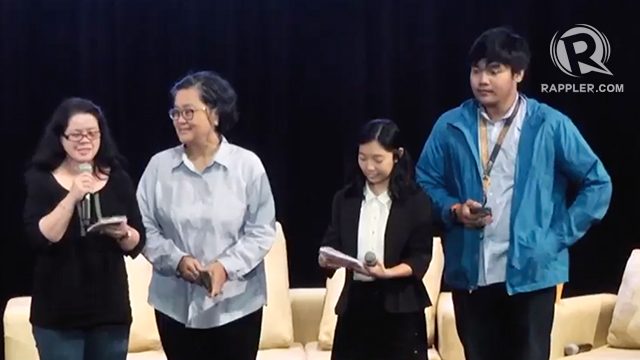SUMMARY
This is AI generated summarization, which may have errors. For context, always refer to the full article.

MANILA, Philippines – Turning sari-sari stores into refilling stations to cut down sachet use in the Philippines won as the best solution to the country’s plastic problem during the 2019 Social Good Summit: #2030Now #InsightForImpact.
Participants Fiona Fajardo Hernandez, Nana Luz, Princess Nepomuceno, and Anthony Cabatuando represented the winning group and presented this idea in front of thought leaders, educators, policy makers, members of the local tech and startup community, and students at the De La Salle University on September 21.
The group explained that the Filipinos’ sachet culture, or the inclination to buy products in small packaging, makes it hard to address plastic pollution. With 21% of the population living below the poverty line, it’s no surprise that the average Filipino uses 591 pieces of sachets in just a year, which usually end up in the oceans.
“These are people who cannot be bothered with causes. We cannot tell them to save the environment when you are barely surviving, you save yourself and your family first,” said Hernandez of non-governmental organizations F.E.E.D. Philippines and Bicycle Scouts Philippines.
The group explained that turning local stores into refilling stations for basic necessities, such as shampoo and cooking oil, will encourage people to discontinue unnecessary sachet use even for purchases in small amounts.
“Because in turn, if these sari-sari stores would be the prime connection between the consumers [and the producers], it would be accessible to people who are unable to actually provide for themselves these [big] amounts that local supermarkets provide in bulk,” said Nepomuceno, a political science student at the Polytechnic University of the Philippines.
Luz, CEO of cloud services company Softype Philippines Incorporated and a tech entrepreneur passionate about waste management and reduction, said turning sari-sari stores into refilling stations is just the first step to eventually shift the demand from corporations.
The group also proposed to give value to discarded sachets to encourage people to pick it up as a form of positive reinforcement. They suggested that a law may be enacted that will reward citizens with 1% to 2% of the actual price of the sachet every time they pick it up.
“Just picture this: If you find something on the ground and that might be worth 2 centavos, you might pick that thing up. You use the reverse supply chain of the Unilevers and the URCs of this world to pick these things back, bring it back,” Luz said.
Four groups presented different ideas to address plastic pollution in the country. The judges were composed of the speakers of the huddle: Meah Ang See, Angela Chen, Xin Yi Wong, Dr Eric Punzalan, and Dr Alvin Culaba. – Rappler.com
Add a comment
How does this make you feel?
There are no comments yet. Add your comment to start the conversation.